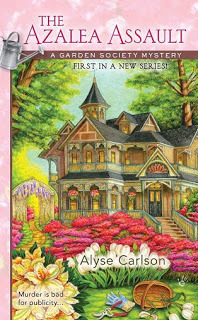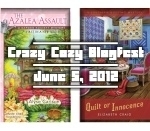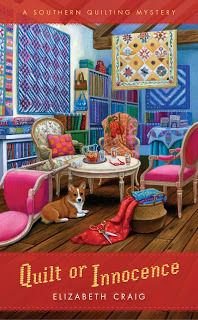Riley Adams's Blog, page 179
April 12, 2012
Another Reason Experience is Important for Writers
by Elizabeth S. Craig, @elizabethscraig
[image error]I spent the other morning at the DMV. The DMV, for my non-US readers, is the Department of Motor Vehicles. It’s one of those dreaded places here in the States—full of high counters and long lines.
My son was with me to get his driving permit. We’d arrived 45 minutes before the office opened and were already 5th in line. By the time it opened, the line wrapped around the corner of the squatty government building. It was freezing outside—a shock after such a balmy winte--and my son and I were moving around, swinging our arms, as we waited. His bouncing was probably nerves and mine was a futile attempt to keep warm.
We finally navigated through the different stations after a bad moment where we’d sat in “the wrong set of chairs” for what we were in line for. The DMV has always reminded me a little of Dickens’ Circumlocution Office. We quickly sat in the right set of chairs and my son took his test.
And, thankfully, passed it. But he wasn’t completely satisfied because he’d missed several questions and he’s a typical Type-A firstborn.
“Mom, I missed the stupidest questions!”
“I’m sure they weren’t stupid.”
“They were. One of them asked when roads are the slickest. I chose ‘after three hours of raining’ because of all the cars that hydroplane—the roads have got to be really slick then. But they said the right answer was ‘within the first 15 minutes of raining’,” he said.
“Ohh. Well, yes. They’re right. That’s because the oil rises up to the road surface and you skid on all the old oil puddles on the road,” I explained.
This didn’t cheer him up. “See! Even you knew it and you haven’t even studied the book.”
“But I’ve been driving for 26 years. I know it completely through experience.”
I think that’s one thing that sometimes gets missed when writers recommend frequent writing as a way to improve. What tends to get mentioned is the skill you acquire.
What I think practice and experience gets you are personal strategies for advancing a story and the confidence to complete one.
If you hit a roadblock, you’ll know the best way for you to handle it. For me, that means marking the scene with asterisks and coming back to it later.
You’ll know what to do when you’re stuck on a scene and you aren’t in the right mind-frame to write it. For me, this means skipping the scene and writing another one that’s better suited to my mood.
You’ll find the easiest method for you, yourself, to write a book…you’ll learn if you should outline, wing it, write in the mornings, write in the evenings, write during your commute. You’ll learn shortcuts, your strengths and your weaknesses. You’ll learn how to keep yourself motivated.
You’ll gain confidence that you can finish a book, submit it, and stomach the reviews, good or bad.
Experience is the only way to figure out what works best for us. It’s the only way to know how to make it through the obstacle course that each book presents. It’s the only way to deal with the end result of being published and having that book in the hands of the readers.
You can read manuals on driving and manuals on writing. But experience counts more. (And, I’d add, experience reading the genre that you write.)
It’s true that our writing improves each time we sit down to write and with each book that we finish. I know my books have stronger verbs, better dialogue, rounder characters, and more literary elements than they did when I started out.
That improvement is more intangible and murky, though, unless it’s directly compared side by side with other examples of my writing. What motivates me, usually, are tangible results. Motivation is a stack of finished books and my level of confidence— things I can easily see, easily feel.
It’s the knowledge of what to do at an intersection full of oil slicks when it starts to rain.
What does your regular writing habit help you gain?
April 10, 2012
Constructing and Weaving in Subplots
by Elizabeth S. Craig, @elizabethscraig
My last post was about my layering approach to writing books, and I got a question from a blog reader about how to create subplots and then how to weave the subplot layer into a finished draft.
Subplots are sometimes my favorite part of a book. In fact, occasionally the main plot of a novel will leave me cold as a reader and I'll flip ahead in the book just to find out how the subplot ends up.
My subplots are almost always humor-based and end up tying into the book's ending. Your subplot could involve a budding romance, or the protagonist's teenager's gradual descent into drug use…really, any plot smaller than the main one that can enhance the main plot (through conflict or character development or by adding complications) in some way.
*****Since I don't like to write spoilers for anyone else's books, I'll do a couple for mine (in books that are older releases) as examples… they're minor spoilers. But heads up if you're one of my readers!*****
What I do is come up with complete, small episodes…almost short stories. Then I create scenes with each installment of the subplot story, to create what will end up being a running serial throughout the main plot. For me, it could even be on the level of a running joke that suddenly has more significance at the end of the book.
Most of my books have more than one subplot. The subplots vary in length and complexity. I'll use two for examples…a very short one and a longer one.
One of my subplots involved two men who were friends with each other and also friends with my sleuth. One of the men was bragging about a prized bottle of expensive and rare wine that he'd acquired. The other man kept dropping hints or outright begging to come over and share a glass of this wine. He found opportunities to celebrate and eagerly asked his friend if he'd open the bottle. But the friend always refused.
I started this subplot fairly early in the book—and dropped in the dialogue mentioning it following a regular scene in the book. So I had a first mention of the subplot with the man bragging about the wine. Then I continued with it at intervals throughout the story….again, each mention was like a mini-episode or the next installment of the mini-serial. So I wrote in a couple of other mentions, escalating the friend's frustration and his requests to participate in a wine tasting.
Then, at the end of the book, I had the friend completely give up on the chance that he'd ever sample the wine. He decides to go to the wine store and purchase a bottle himself. On the way back with the wine, he comes across the sleuth in a perilous situation near the wine store, and drops the bottle to come to her aid.
This is really, the briefest of subplots. It adds a little humor to the story when things get serious with the murders. It gives the opportunity for bits of character development as my protagonist reacts to the friends' battle over the wine. It gives a change of pace. And then the subplot makes a surprise appearance again at the end of the story and lends a feeling of continuity and completion at the finish.
Another subplot I wrote into a different series was a little longer and a bit more involved. My protagonist for that series, Myrtle, is a crotchety elderly woman who has a reputation for being prickly. A feral cat takes up with her and she genuinely becomes charmed with it…although the cat attacks visitors to her home. She admires its toughness.
Again, I wrote the subplot straight through on a separate document—the whole story of the subplot in episodes. Then I wove those little episodic scenes into the main plot and tied it into the ending.
Throughout the story the subplot developed: Myrtle becomes acquainted with the cat, the cat acts out with various visitors to the home. The cat develops a true fondness for Myrtle and decides to bring her gifts—sometimes gifts that aren't dead. Myrtle receives bunnies and other creatures from her determined cat friend. I interspersed these episodes throughout the book. This particular subplot helped develop Myrtle as a character—and showed another, softer, side to her.
At the end, when Myrtle is confronted by the killer, a separate subplot comes back into play (Myrtle's horrible cooking that plagues the series) which leads into the cat's intrusion during Myrtle's confrontation with the murderer….which creates enough of a distraction for Myrtle to take control of the situation.
So….that's it in a nutshell. I do want my subplots to end up impacting the main plot, develop my characters a bit, and relieve tension in my books. I write them as complete stories, then chop them up into scenes and intersperse them through the main story. Then I tie the subplot into the ending of my book (which also helps me with writing endings…never my favorite thing to write.)
Hope this helps instead of being completely confusing. Now it's your turn—how do you write in subplot layers to your book? I'd love to hear some other ideas (especially since, when I find something that works for me, I stop thinking of other approaches!)
April 9, 2012
Lists and Layers
by Elizabeth S. Craig, @elizabethscraig
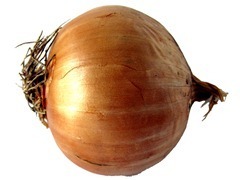 Recently I was at an event where I spoke with aspiring authors after my talk.
Recently I was at an event where I spoke with aspiring authors after my talk.
They asked about the number of books I'd written, then they looked both amazed and discouraged at the same time. "How do you get through a book? There's just so much to think about when you're writing."
I told them that I try not to think about the big picture (plowing through 275 pages, editing it, submitting it to my editor, and worried waiting for reviews) as much as possible. It just makes me feel overwhelmed. If I approach the book as simply advancing the story a day at a time (with an idea of where I'm heading and keeping in mind what readers might enjoy most), then it seems like a much smaller project.
Another trick is that I'm not trying to keep everything in mind as I'm writing a book (except reader enjoyment.) I love reading books about writing, magazine articles on writing, and blog posts on writing, but I can't focus on character arc, story structure, engaging descriptions, and all the other elements that these resources recommend for a good story.
I use layering and lists as tools to make sure I round out my story later. I write my books straight through (without pausing for chapter breaks) and end up with about 55,000 words. This is the bare-bones story. Then I start layering in other elements. This is what I'm doing right now to put the finishing touches on a book I'm turning in at the end of this month.
Layers
Parts of the book that I add in layers for 2nd and 3rd drafts:
Setting descriptions Character descriptions Character last names and place names (I'll mark as *** on the draft so I can find my spots later.) Any scenes I was stuck on. I just make a couple of notes about what I wanted to accomplish with the scene and move on to the next scene. Subplots can be included perfectly as a separate layer. In fact, it's almost easier that way because you can just gradually weave them in to the story that's already on the page.I do the same thing with revising. If you think to yourself that you're editing a whole book, the thought of it can be just as overwhelming as writing the book was.
These are issues that I address in layers for the revision (and for a longer list of things I look for during revision, click this post)
Typos/grammar Crutch words that I use too frequently Conflict—I make a pass through to make sure each scene either forwards the plot or adds to the conflict Continuity (is the character wearing the same outfit on page 20 that she's wearing on page 21?) Subplots—did they resolve? Did they tie into the main plot? Loose ends—is everything resolved at the end of the book?Lists
Somehow, it's easier for me to come up with lots of different ideas if I make them into bullet points and put them in list form. These lists could include:
My protagonist's catch-phrases.
My protagonist's features. Different physical traits of my protagonist.
My protagonist's facial expressions.
*5 possible endings for this book.
*5 twists.
*5 possible subplots.
*5 ways the subplots could tie into the main plot.
Or you could do it for character growth:
*5 ways the character could grow.
*5 surprising things that we could learn about a character.
*Top 10 list of things that bother the protagonist (then 10 things that would drive the character crazy that I could write into the book.)
*10 things this character loves more than anything.
You could find other uses for lists, too:
*5 ways to add some unexpected elements to the book (humor, suspense, sadness, fear.)
*5 ways to describe the setting.
The best results are woven into the story or used to inspire dialogue that develops my characters more.
These are the tools I use for every book to make sure that I keep things fresh and keep from feeling overwhelmed. How do you keep focused and keep moving ahead with your story?
April 7, 2012
Twitterific
by Elizabeth S. Craig, @elizabethscraig
 All the links below, and over 15,000 others are found in the Writer's Knowledge Base search engine—where you can search on any topic for free. Like us on Facebook or sign up for our free monthly newsletter for the web's best links on writing.
All the links below, and over 15,000 others are found in the Writer's Knowledge Base search engine—where you can search on any topic for free. Like us on Facebook or sign up for our free monthly newsletter for the web's best links on writing.
Don't' forget the new release blogfest that Hart Johnson and I are hosting on June 5th—find more information and sign up here. The best entries get signed copies of our new releases!
5 Ways to Get Past Writer's Block: http://bit.ly/Huvrsk @fictionnotes
Fight scene basics: http://bit.ly/HuvSTs @jamesagard
You're agented? Cool! But can she sell you? http://bit.ly/Hadtg9 @behlerpublish
PublishAmerica, Literary Agent: An Inside Look: http://bit.ly/H4IDHa @victoriastrauss
5 Ways to Liven Up a Description: http://bit.ly/H4IH9Y @DiYMfa
Making Platform our Art: http://bit.ly/H4IYcV @KristenLambTX
How Screenplay Structure Can Help Plotting & Pace In Your Novels: http://bit.ly/H4J6cp @BryanThomasS
Taking the Mystery Out of Writing Mysteries: http://bit.ly/H4Jc3K @DPLyleMD
Trust your instincts: http://bit.ly/H4JkQT @anna_elliott
Is creativity going the way of the collective? http://bit.ly/HxI34t @creativitypost
6 Benefits of Blogging: http://bit.ly/HxIuM8 @LyndaRYoung
Advice for writers on GoodReads: http://bit.ly/H3KAEJ @WriterCrys
4 tips for writing humor: http://bit.ly/H3J2ux @write_practice
Character Development Questions: http://bit.ly/HxJjom @HeatherMcCorkle
The Rise of Indie Authors and How This Helps Publishing: http://bit.ly/HxJos9 @thecreativepenn
Startup Costs Of Freelancing: http://bit.ly/HxJwb6 @writertank
5 Tricks To Adapting A Well Known Story For Fiction: http://bit.ly/Hr4p8w @BryanThomasS
3 Writing "Cheats" for Making Dialogue Work Harder & Ring True: http://bit.ly/Hr4Dg7 @MuseInks
A TV Guide Approach to Hooking Your Reader: http://bit.ly/H2zFFY @writerashley
Turning your ebook into a free ad: http://bit.ly/H86irr @curiosityquills
When Characters Change (or Don't): http://bit.ly/H86ruX @beth_barany
Read Your Way to Better Writing: http://bit.ly/H86xTi @writeitsideways
Should You Write the Whole Trilogy Before You Query? http://bit.ly/H86Cq1 @Janice_Hardy
An Agent Defines "Unsolicited Manuscripts": http://bit.ly/H86Ld3 @bookendsjessica
What If Our Story Idea Has Already Been Done? http://bit.ly/H86RBo @JamiGold
Precise story summaries are key to queries: http://bit.ly/H86Xcr @greyhausagency
How to do Social Media Right: http://bit.ly/H870F1 @AskATechTeacher
A helpful look at the Wordpress dashboard: http://bit.ly/H874ol @jhansenwrites
Why We Need to Put Our Books to Bed: http://bit.ly/H878Eq @jodyhedlund
Goodreads' guide to dystopian novels (infographic): http://bit.ly/H87lHD
Outside the box marketing: http://bit.ly/H87qLH
The Next Self-Publishing Frontier: E-Books In Translation: http://bit.ly/HEPvbu @laurahazardowen
The Write It Forward Author Marketing Plan: http://bit.ly/HEPYKY @jentalty
The New iPad Reviewed For Authors: http://bit.ly/HEQgkY
Making Sure Your Agent Can Sell You – Part 2: Description vs. Specifics: http://bit.ly/HEQybB @behlerpublish
Symbols in The Hunger Games: (series spoilers): http://bit.ly/HEQSae @tordotcom
How Honesty Compels Readers to Comment: http://bit.ly/HER0GA @problogger
The Marketing Paradox: Start Small to Get Big: http://bit.ly/HERQmS @janefriedman
That Final Manuscript Cleanup: http://bit.ly/HaPlIm @noveleditor
Narrative, Plot, and Story: http://bit.ly/HaPmMm @writing_tips
Scene endings and sub-genres: http://bit.ly/HaPv2v
The Potential of Social Media in Driving Book Sales: http://bit.ly/HQkzmw @digibookworld
What Authors and Publishers Can Learn from the Hunger Games Marketing Campaign, Part 2: http://bit.ly/HQkSOo @syntactics
A Dialogue Comparison of Twilight and Harry Potter: http://bit.ly/HQmdEO
Moving Beyond Self-Publishing: How are Locke, Hocking, and James selling? http://bit.ly/HFBNGD @PublishersWkly
PublishAmerica, Literary Agent: An Inside Look: http://bit.ly/H4IDHa @victoriastrauss
Tips for a non-fiction proposal: http://bit.ly/HRaO7I @nicolamorgan
Thoughts on being a hybrid author: http://bit.ly/HRb8U2 @KristenLambTX
Writer @ChuckWendig on rejection: http://bit.ly/HRbAS4
Recommending Books for the Characters of "Mad Men:" http://bit.ly/HRbJVC @bookriot
A Reader's Drinking Game, First Edition: http://bit.ly/HRbTMF @NewDorkReview
6 Tips For Hiring The Right Freelance Editor: http://bit.ly/HRcy0D @meghancward
Does Your Character Wear Purple Converses? http://bit.ly/HRcHkJ
Humor Writing for People Who Aren't Funny: http://bit.ly/HRcNcg @jeffgoins for @write_practice
12 Steps to Blog Tour Success: http://bit.ly/HRcSN4
Creative Writing Prompts: Secrets and Lies for Your Characters: http://bit.ly/HRcZYY @howtowriteshop
Believing We Have a Story to Tell: http://bit.ly/HRdjad @AReasonToWrite
Tips on Showing Character Motivations: http://bit.ly/HRdmmk @Janice_Hardy
Worldbuilding--measurements: http://bit.ly/HH1jdu @JulietteWade
How writers can flourish when confronted with story restrictions: http://bit.ly/HH1Dsx @storyfix
Freelancer Advice from NYT Magazine Culture Editor: http://bit.ly/HH1Snu @jasonboog
Traditional Publishing: The Query And The Funnel: http://bit.ly/HH1ZPV @thecreativepenn
60 Synonyms for "Trip": http://bit.ly/HH2cCK @writing_tips
Patient Sues Doctor for Using Her in a Book: http://bit.ly/HH2h9B @passivevoiceblg
How Much Should You Write Every Day? http://bit.ly/HKGq0O
Does comedy have to be cruel? http://bit.ly/HKGBJz @salon
Elements of Fantasy: Brownies: http://bit.ly/HKGD4i @fantasyfaction
Why The Hunger Games Is the Future of Writing: http://bit.ly/HKGL3I @jeffgoins
11 things to know about blogging: http://bit.ly/HKHxO9 @victoriamixon
Finding the Story in Nonfiction: http://bit.ly/HKHHoI
Tips for Writing the Small Town Romance: http://bit.ly/HKHNwC @ktlane3
A tip for making a living as a writer: http://bit.ly/HKHS3n @rachellegardner
Amazon's Author Central: Keeping Track of Your Books: http://bit.ly/HKHZvO @fictionnotes
Story Structure--Inciting Event and Key Event: http://bit.ly/HKI0Qj @KMWeiland
How Writing against the Grain Creates a Niche: http://bit.ly/HKI82l @hopeclark
The Writing Life: The Value of Tenacity: http://bit.ly/HKIciv
Quirks and legs matter more than talent and perfection: http://bit.ly/HKIeHh @speechwriterguy
Feeling stuck? 7 "block" busters for writers: http://bit.ly/HKIl5H @RuthHarrisBooks for @annerallen
Writing Tips: Guns, Bullets And Shooting: http://bit.ly/HKIqX2 @dsawyer for @thecreativepenn
The Chicago Manual of Style isn't the only guide, reminds one editor: http://bit.ly/HKIwhl
Steps to take when preparing to write a novel: http://bit.ly/HKINRk @lisagailgreen
Trends in Publishing: Android Apps for Writing: http://bit.ly/HKIOEW @chicklitgurrl
Give Your Writing A Case of Spring Fever: http://bit.ly/HKIXrS @serbaughman for @writeitsideways
Basic Plot Brainstorming: http://bit.ly/HKJ1ba @eMergentPublish
Persistence Often Leads to Publication: http://bit.ly/HKJ2vT @livewritethrive
Why 1 Writer is Considering Deleting Her Facebook Account: http://bit.ly/HKJ9aP @janice_hardy
The use of gossip and rumors in crime fiction: http://bit.ly/HhJfZ4 @mkinberg
When worldbuilding becomes too much: http://bit.ly/HhK4kF @greyhausagency
5 blogging lessons inspired by parenting: http://bit.ly/HhKaZk @rzive
Celebrating the Complicated Girl: http://bit.ly/HhKjMz @yahighway
10 tips for conferences: http://bit.ly/HhKAyU @msheatherwebb
Scrap"irregardless": http://bit.ly/HhKDe2 @howtowriteshop
5 SEO Blog Tips to Increase Traffic to Your Site: http://bit.ly/HhMG1W @karencv
3 Pieces of Advice For Aspiring Authors: http://bit.ly/HhMRtV @ChuckSambuchino
Tips for ending chapters: http://bit.ly/HhMYFV @Kid_Lit
The Seattle Times--no fan of Amazon: http://bit.ly/HhOeZE @Porter_Anderson @LauraHazardOwen
Writers--self-pub moonlighting is serious business: http://bit.ly/HZSqhL @Porter_Anderson @CFSaller @jamesscottbell
Completion, and Resonance: why the first chapter is like the last: http://bit.ly/Hruwqb @juliettewade
3 ideas for developing voice: http://bit.ly/HruGOc @KristenLambTX
Farther vs. Further: http://bit.ly/HruM8A @writing_tips
13 Ways to Develop a Story That's Too Short: http://bit.ly/HruQoF
Life is Short. Read with Purpose. http://bit.ly/Hrv0MU @diymfa
Story structure tips: http://bit.ly/Hrv53j
Story endings and resolution of conflicts: http://bit.ly/HrvaDW
How To Pitch Your Book to Online Outlets: http://bit.ly/Hrvhzo @galleycat
Simple tips for keeping a journal: http://bit.ly/HrwLd7
Training The Writer: http://bit.ly/HrwS8z @sarahahoyt
Do-It-Yourself Publishing: http://bit.ly/HrxpqX @passivevoiceblg @Occupy_Pub
5 Ways to Get Your Book into Bookstores: http://bit.ly/HqoASf @jkairys for @JFBookman
Defining literary fiction: http://bit.ly/HqoJoH @janefriedman @sanjidaoconnell
7 Dialog Basics That Can Help Tighten Our Stories: http://bit.ly/HqoLgz @jodyhedlund
You Must Engage Your Creative Side: http://bit.ly/HqoSsi @jeffgoins
7 deadly sins: http://bit.ly/HqoTwv
Keep Your Characters True To Themselves: http://bit.ly/Hqp231 @SharlaWrites
The Dos and Don'ts of Novel Endings: http://bit.ly/Hqp3Uz @writersdigest
10 Blogging Fears Worth Chasing Down: http://bit.ly/Hqp8HZ @catseyewriter
Selling Ebooks Direct: How To Set Up A Simple E-Bookstore: http://bit.ly/HqpbDF @DavidGaughran
Who to Trust When Writing Your Book? http://bit.ly/Hqpjmt @originalimpulse
Writing lessons learned from Heist Society: http://bit.ly/Hqpoqg @juliemusil
When query letters mention professional editing: http://bit.ly/Hqprm7 @behlerpublish
Microsoft OneNote – An Author's Best Friend: http://bit.ly/HqpwWT @selfpubreview
Twitter Tips: How to Keep Your Followers: http://bit.ly/Id1Jce @AnnieNeugebauer
The Power Of Diligence: http://bit.ly/Id1VbI @BryanThomasS
7 Blogging Mistakes Authors Make: http://bit.ly/HlZQuM @goblinwriter
8 Reasons Your Story Might Not Be Selling: http://bit.ly/HPHQXZ
1 writer's typical process for writing a chapter: http://bit.ly/Hm06Kf @fictionnotes
2 Tips to Accelerate Completion of Your Writing Projects: http://bit.ly/Hm0dWf
Use music as motivation to write: http://bit.ly/Hm0k40 @byrozmorris @jamesscottbell
How to start a blog: http://bit.ly/Hm0p7S @woodwardkaren
Top tips for cozy mystery writing: http://bit.ly/Hm0tEB
Story structure--the reversal: http://bit.ly/Ho03zx @Mommy_Authors
Is your book a Fence-Sitter? Consider finishing your book! http://bit.ly/Ho0g5I @behlerpublish
6 Core Storytelling Competencies: Good… Better… Best. http://bit.ly/Ho0oC5 @storyfix
How to successfully launch a YA print novel: http://bit.ly/Ho0OZk @laurapauling
April 5, 2012
Top Tips for Cozy Mystery Writing and a Crazy Cozy Blogfest
by Elizabeth S. Craig, @elizabethscraig
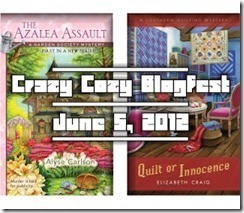 Today I thought I'd move into mystery writing territory for a while and include some of my top tips for cozy mystery writing (some of which will work well with other types of mysteries.)
Today I thought I'd move into mystery writing territory for a while and include some of my top tips for cozy mystery writing (some of which will work well with other types of mysteries.)
Today's post comes a little less than two months before the release of a new cozy series for me and the debut of a new cozy series from my friend Hart Johnson. We thought we'd band together and make a fun blog hop on June 5th) to celebrate our releases and host a giveaway. More information is at the bottom of the post.
What's a cozy mystery? Cozies, sometimes called traditional mysteries, are a subgenre in a large field of mystery subgenres. They're primarily defined by their use of an amateur sleuth, lack of gore and profanity, offstage murder, and focus on the whodunit puzzle. These mysteries are frequently (not always) humorous, character-focused, set in small-towns, and are part of a series.
Tips for cozy writing:
The sleuth will be a gifted amateur, but you'll want to have a police source. Make sure your sleuth has access to some of the same information that the police has—time of death and the potential weapon, for example.
Make sure you're leaving several clues to the murderer's identity, but aren't making them too obvious. The clues need to be scattered throughout the book, but the reader doesn't need the equivalent of a neon sign pointing out that a clue happened. Find a way to lay the clue but to distract attention from it—maybe another suspect arriving on stage? A sudden argument between the sleuth and another character? Something that seems like a more important clue?
Give the reader a reason to care about the case. Is the victim someone very likeable and innocent and they want to avenge her death? Is one of the suspects wrongly accused and needs to be vindicated? Is the sleuth somehow personally involved or emotionally connected to the case?
Be careful with your number of suspects. Suspect numbers can get a little tricky. You want enough suspects to ensure that the killer's identity is a surprise, but not so many that the reader forgets who they are. I usually like five suspects, killing one in the middle of the book. One of my editors actually prefers fewer.
Have suspects tell both lies and truths. The sleuth and reader will try to discern which is which. If everyone has something to hide or someone to protect, it creates a lot more conflict in the story.
Consider eliminating the most promising suspect. It can shake up a story in the middle of a book.
Now, to help Hart and me with our upcoming releases (and have the chance to win signed books) you can create your own cozy mystery. Except it will be a lot shorter and you don't have to use any of the tips I included above. :)
Sign up with the Linky tool below, adding your blog to our list of June 5th participants.
Include:
1) Sleuth (age, occupation, maybe a little family info)
2) Sidekick (either friend or foil, but someone who always seems to be around)
3) Setting (town, city, or other sort of place)
4) Theme (go nuts)
5) Twist (be as creative as you like)
Write it up in 150-250 words (keeping things short for the blog hop).
Please include either our book descriptions or a promo mention or a link to our sites or for buying books.
Click
here to enter
This list will close in 61 days, 3 hrs, 54 min (6/5/2012 11:59 PM CST
The Azalea Assault
Cam Harris loves her job as public relations manager for the Roanoke Garden Society. It allows her to combine her three loves, spinning the press, showing off her favorite town, and promoting her favorite activity. She's just achieved a huge coup by enlisting Garden Delights, the country's premiere gardening magazine, to feature the exquisite garden of RGS founder, Neil Patrick. She's even managed to enlist world-famous photographer Jean-Jacques Georges. Unfortunately, Jean-Jacques is a first-rate cad—insulting the RGS members and gardening, goosing every woman in the room, and drinking like a lush. It is hardly a surprise when he turns up dead. But when Cam's brother-in-law is accused and her sister begs her to solve the crime, that is when things really get prickly.
Alyse Carlson: Alyse Carlson is the pen name for Hart Johnson who writes books from her bathtub. By day she is an academic researcher at a large Midwestern university. She lives with her husband, two teenage children and two fur balls. The dust bunnies don't count. This will be her first published book.
Links:
Amazon
Barnes and Noble
Indie Bound
Confessions of a Watery Tart
Prizes: Hart/Alyse and I will pick our our favorite entries and both winners will get signed copies of both books.
Please help us promote the blogfest by taking the button and banner (thanks to artist Joris Ammerlaan for the buttons) and/or share the Linky Tool below for the blog hop.
Quilt or Innocence
Beatrice has a lot of gossip to catch up on—especially with the Patchwork Cottage quilt shop about to close. It seems that Judith, the landlord everyone loves to hate, wants to raise the rent, despite being a quilter herself… But when Judith is found dead, the harmless gossip becomes an intricate patchwork of mischievous motives. And it's up to Beatrice's expert eye to decipher the pattern and catch the killer, before her life gets sewn up for good.
Elizabeth Spann Craig: Elizabeth writes the Memphis Barbeque series for Penguin/Berkley (as Riley Adams), the Southern Quilting mysteries (2012) for Penguin/NAL, and the Myrtle Clover series for Midnight Ink. She blogs daily at Mystery Writing is Murder, which was named by Writer's Digest as one of the 101 Best Websites for Writers for 2010, 2011, 2011.
Links:
Amazon
Barnes and Noble
Indie Bound
Mystery Writing is Murder
Thanks, everybody!
April 3, 2012
Internal Dialogue
by Elizabeth S. Craig, @elizabethscraig
 One of the hardest things for me, starting out as a novelist, was internal dialogue.
One of the hardest things for me, starting out as a novelist, was internal dialogue.
Mysteries require the sleuth to mull things over. I really struggled over how to make these passages work. I tried putting thoughts in italics. I tried writing in first person. I tried showing thoughts through the character's actions and dialogue with other characters.
I must have scrapped fifty or more pages of rotten internal dialogue. It all seemed like it would jerk a reader right out of the book.
I think this is one of those areas where the more we write, the more we get comfortable (and maybe different approaches work with different writers.) I thought I'd share what works for me now:
Deep POV: Deep point-of-view puts readers inside the character's head for an intimate view of his world. While you're in this character's head, you can look at the world through his eyes (noting the kinds of things he would find striking or interesting or irritating or disconcerting and remark on them in that character's voice and using his vocabulary.) In deep POV, you can also get rid of words like thought, wondered, and knew since the reader understands that they're reading from that character's perspective. The reader sees, hears, and notices only what that character would. It's also a great way to show instead of tell (Her heart pounded instead of Judy was frightened, etc.)
I like fantasy writer Juliette Wade's checklist for Deep POV. And writer Terry Odell has a quick trick for making sure you're staying in deep POV:
To "test" yourself: Substitute "I" for "he" (or the character's name) in a scene. Is there anyone else sneaking in there?
Sidekicks: Too much straight narrative usually makes me want to skim, so I try to interrupt it with dialogue when I'm writing. One way to know what a character is thinking is by having that character bounce ideas off of another character…a sidekick. In mysteries, this sidekick can be a Dr. Watson or a Captain Hastings type who actually helps with solving the case, but in your genre, this could be a best friend, spouse, parent, child—you get the idea.
How do you handle internal dialogue? Do you use much of it in your books?
April 2, 2012
Character-Based Humor
by Elizabeth S. Craig, @elizabethscraig
Recently I was asked for tips on writing humor. My books are billed as humorous cozies and the person emailing me asked if I could share some techniques. 
I think that's a tough subject to tackle, actually. In person, I have a more dry sense of humor—I'm definitely not that much of a funny person unless I'm telling a story. When I'm writing, I'm usually working with a particular type of humor…character based. Let me use Saturday as an example (and we all have days like this.)
I've mentioned before that my ten year old daughter is absolutely obsessed with horses. I don't share the obsession, but I'm happy to facilitate her horse fixes (to a point! My husband and I keep insisting we won't become horse owners.)
She was set on going to the Carolina Cup steeplechase race on Saturday, so I bought a couple of tickets and packed a lunch and we were off.
I knew, though, that the entire situation was fraught with danger. She was so determined to watch the horses. This meant that the universe would conspire for her not to see the horses.
And, sure enough, problems arose right away. The website directions from Charlotte to Camden, SC weren't clear and took us off in the wrong direction. I finally turned on my GPS and got us heading in the right direction. And we ended up getting there fairly late and ended up having to park with the college kids who'd come with their kegs.
Because we'd parked so far away, it was about 3/4 of a mile to reach the main course. We had to cross the infield and stamp through the tall grass. As we got closer to the course, the spectators grew older and banquets were laid out with fine silver. This was all ignored by my daughter, intent on the horses.
We got as close as we possibly could. I squinted at the grandstand and asked a staff member, "Can we sit there? I see seats. My daughter wants to see the horses."
"If you have $650 a person."
I decided we would just get as close as we could aside from being in the grandstand.
Of course, I'd forgotten to bring the folding chairs from the trunk. I told her to stay put and not to talk to strangers and I trotted back the 3/4 mile to the car. As I was returning, still running, with the chairs, they closed off the gates to the infield I needed to cross…because the horses were running through. This, naturally, added another 20 minutes to my trip back…and when I returned she told me in exasperation that a crowd of people had come up to ask her if she'd "lost her mommy." They wouldn't stop worrying over her and coddling her and she'd had a difficult time craning her head to see the course.
Between the bacchanalian shenanigans of the college students who occasionally staggered up to see the horses and blocked our view, friendly and well-meaning spectators who tried striking up conversation with my doll-like-diminutive and grimly focused daughter, I was hiding a smile most of the day. If I'd been writing a book, these would have been the basic components for a humorous scene: the serious little girl, ferociously intent on the horses and the world working against her.
Character based humor is my favorite kind of humor. It's easy to write and doesn't only create humor—it also makes for conflict (a gentler sort) and character development, too.
Even easier is a comic foil for the protagonist—someone who will put the character in these humorous situations on a regular basis: what we saw in The Odd Couple with Felix and Oscar.
What made Lucy and Ethel's struggle in the candy factory so funny? One reason was that they were so earnest about doing well but completely unsuited for the job they were facing. Because they were so serious about making a paycheck, the day's unraveling and their horror at it, made the situation funnier and funnier.
This is as close as I can come to explaining my approach to humor, but I'm interested in hearing yours. Do you write humorous scenes into your books? Have any tips?
March 31, 2012
Twitterific
by Elizabeth S. Craig, @elizabethscraig
 All the links below, and over 15,000 others are found in the Writer's Knowledge Base search engine—where you can search on any topic for free. Like us on Facebook or sign up for our free monthly newsletter for the web's best links on writing.
All the links below, and over 15,000 others are found in the Writer's Knowledge Base search engine—where you can search on any topic for free. Like us on Facebook or sign up for our free monthly newsletter for the web's best links on writing.
Hope everyone has a great week of writing!
Description vs. Exposition: http://bit.ly/HnpmPM @DIYMFA
Voice–The Key to Literary Magic: http://bit.ly/Hnp8I8 @KristenLambTX
Nook May Be Expanding Internationally, But Barnes & Noble Stores Aren't: http://bit.ly/Hnp1wn @laurahazardowen
How to Read a Book Contract – Agents and the Law: http://bit.ly/HnoNFC @PassiveVoiceBlg
Writing craft: Romancing remuneration: http://bit.ly/GZR6u4 @Porter_Anderson @rachellegardner @spressfield
Getting a Handle on Your Short Story Queue: http://bit.ly/GXh27v @/johnremy
Approaches for brainstorming a scene: http://bit.ly/GXgOgG @fictionnotes
How to Improve Your Ebook Sales: http://bit.ly/GXgLl4 @goblinwriter
The 1st Steps to Building an Author Platform: http://bit.ly/GXgyOF @DanBlank for @KathyPooler
How to Plot Without Plotting: http://bit.ly/GXgq1y @ava_jae
3 deep characteristics of dialogue: http://amwriting.org/archives/10230 @p2p_editor
The Pottermore Uproar: http://bit.ly/H1zWy3 @Porter_Anderson @philipdsjones
Using a pie chart to find a new book? http://bit.ly/GXgb6F @PublishersWkly
4 Commandments to Writing Funny: http://bit.ly/GXfSZA @write_practice
Write what you can find out: http://bit.ly/GXfOJh @fuelyourwriting
Tips from a bookseller on getting your book in stores: http://bit.ly/GXfJp5
Which Comes First? Character, World, or Plot? http://bit.ly/GXfA4V @lisagailgreen
Advanced 'Write Tight': http://bit.ly/GXfrhW @PBRWriter
Mind the gaps in your manuscripts: http://bit.ly/GXePc6
Simple SEO for Authors: http://bit.ly/GXeiH9 @JFBookman
The Making of a Bestselling eBook Cover: http://bit.ly/HgiOj
The first blog comment is the tipping point: http://bit.ly/H0OUSN
Writing Job Listing: Is It Legitimate or a Scam? http://bit.ly/xdnveX @luannschindler
Getting Better vs Being Good: http://bit.ly/FUPmg2 @the99percent
Authors: climbing the walls: http://bit.ly/GGbvpF @Porter_Anderson
Sometimes revision means rewriting: http://bit.ly/GQaXfv @TaliaVance
Are You Committing These E-mail Sins? http://bit.ly/GQb76G @janefriedman
Does Advertising Work for Authors? http://bit.ly/GWHvSP @goblinwriter
Profiting Outside Amazon: http://bit.ly/GWHM8x @SarahWoodbury
7 Steps to a Better Blog: http://bit.ly/GWHTAU @DIYMfa
7 Mistakes To Avoid When Writing Your Memoir: http://bit.ly/GWI6nM @danasitar
IMPACT: Your Story's Effect: http://bit.ly/GWIl2a @artzicarol
Religion in Worldbuilding: http://bit.ly/GWkMcZ @JulietteWade
This is Your Brain on Metaphors: http://bit.ly/GWllnp @creativitypost
Why You Might Ignore Your Favorite Author's Jerkiness: http://bit.ly/GWlruZ @readingape
Intriguing adaptations: http://bit.ly/GWlPK5 @Ravenrequiem13
The 5 most common author website mistakes: http://bit.ly/GY2Hcn @authormedia
The Cage, or Why 'No' is Creativity's Greatest Enemy: http://bit.ly/GY2Tsc @cagelessthink
Knowing the requirements for a professionally formatted book: http://bit.ly/GY2WEs @curiosityquills
Ethics vs. Morals: http://bit.ly/GMbBZ3 @writing_tips
Stuck in a Creative Funk? Try These 12 Tricks: http://bit.ly/GMbFb6 @jeffgoins
Questions For Your Beta Readers: http://bit.ly/GMbL2m
Ready to Submit? Check again…: http://bit.ly/GMbMn3 @fantasyfaction
Thoughts on writing transition and set-up scenes: http://bit.ly/GNudX6 @mooderino
Writing: The Starburst Method: http://bit.ly/GMPN3v @woodwardkaren
Know Your Own Writing Journey & Go at Your Own Pace: http://bit.ly/H1x5iF @jodyhedlund
Writing a Novel: a drama told in three acts, with a prologue and epilogue: http://bit.ly/H1xlhD @SophieMasson1
A follow's not a book sale: http://bit.ly/GPdExH @internspills
How to Read a Book Contract – Can I Ever Get Rid of My Agent? http://bit.ly/GPdIxs @PassiveVoiceBlg
How to Use Pinterest to Market Your Book: http://bit.ly/GPdOoC @writersdigest
Social media and stages of your writing career: http://bit.ly/GPe9Yu @kalayna
The evolving writer: http://bit.ly/GPepGR @sarahahoyt
Strictly Objective Critique Partner: A Helpful Thing to Have: http://bit.ly/H6sxZG @YAHighway
How should Shakespeare really sound? http://tgr.ph/GM73BA @Telegraph
An in-depth example of line-editing: http://bit.ly/GOe8C2 @theresastevens
5 Things The Fiction Query Can Learn From a Nonfiction Query: http://bit.ly/GOedpl @writeangleblog
Tension in publishing is from warring scarcity & abundance attitudes: http://bit.ly/GOelVB @kristinerusch
How to Create Your Own Luck as a Writer: http://bit.ly/GOes3x @deemms for @SouthrnWritrMag
Variety in Character Voices: http://bit.ly/GOeusm @noveleditor
1 reason to write a memoir--as a hymn to the past—and a way to go home again: http://bit.ly/HaYIpw @SaraMTaber
Why Cliches about Translations Hurt Books: http://bit.ly/GUEgsz @pubperspectives
Seth Godin's Poke the Box, Doubt, and the Will to Publish: http://bit.ly/GUEuzY @JFBookman
7 steps to publication: http://bit.ly/GUEC2q @nicolamorgan
Make an Editorial Calendar for Your Blog: http://bit.ly/GUEKim @DIYMFA
Why You Should Kill Your Darlings: http://bit.ly/GUERdO @AdriennGiordano for @KMWeiland
Tips for creating a compelling narrative voice: http://bit.ly/H6Nl1l
Delivering vicarious experience through your story: http://bit.ly/H6NstD @storyfix
The 5 most common author website mistakes: http://bit.ly/GY2Hcn @authormedia
An Agent on Pitch vs The Synopsis: http://bit.ly/H6NHVN
How To Handle A Scathing Review: http://bit.ly/H6NT7q @KrisMcMorris
How to Deal with Writers Effectively in One Easy Lesson: http://bit.ly/H6O8ze @RayGarton
Does Solitude Enhance Creativity? http://bit.ly/H6ODJD @creativitypost
Thoughts on character naming: http://bit.ly/H6OPc2 @catewoods
Authors, What to Do When You're Feeling Stuck: http://bit.ly/GUIws2 @beth_barany
25 Russian Words Used in English (and 25 More That Should Be): http://bit.ly/GUIzV1 @writing_tips
"How to Write a Great Scene, or How Tolstoy Broke My Eyes": http://bit.ly/GSyPev @JulieWuAuthor
Writing Lessons From Downton Abbey: http://bit.ly/GSyXL1 @MichelleGriep
Adding Tension to a Scene: http://bit.ly/GSzpZN @Janice_Hardy
Setting the Scene: Weather: http://bit.ly/GSztZw @fantasyfaction
Characters and (the not so) Lonely Writer: http://bit.ly/GSzvR2 @sarahahoyt
A look at the standard warranty clause in contracts: http://bit.ly/GXe9Bm @PassiveVoiceBlg
Title comps (for book proposals)--make them count: http://bit.ly/GSz49j
Why You Should Kill Your Darlings: http://bit.ly/GUERdO @AdriennGiordano for @KMWeiland
Seth Godin's Poke the Box, Doubt, and the Will to Publish: http://bit.ly/GUEuzY @JFBookman
Hiring an Editor: When, Who, and How to Avoid Scams: http://bit.ly/HmDOqp @AnneRAllen
Writing: The Starburst Method (part 3): http://bit.ly/HmE1tF @woodwardkaren
Past Participial Modifiers: http://bit.ly/HmEoEG
Why do authors get treated so badly? http://bit.ly/HmEtIm @dirtywhitecandy
3 Ways to Improve Writing During Revision: http://bit.ly/HmEBaU @sierragodfrey
Success In Writing, Publishing And Marketing Takes Time: http://bit.ly/HmEIDq @janefriedman for @thecreativepenn
What Makes A Story Persuasive? http://bit.ly/GX7HR7 @lkblackburne
Do We Need Maps in Fantasy Books? http://bit.ly/GX7U6Y
A closer look at book contracts: http://bit.ly/GX80v9 @PassiveVoiceBlg
Challenging witnesses in crime fiction: http://bit.ly/HjdoaQ @mkinberg
How to Read a Book Contract – Agents and the Law: http://bit.ly/HnoNFC @PassiveVoiceBlg
Nook May Be Expanding Internationally, But Barnes & Noble Stores Aren't: http://bit.ly/Hnp1wn @laurahazardowen
Voice–The Key to Literary Magic: http://bit.ly/Hnp8I8 @KristenLambTX
Description vs. Exposition: http://bit.ly/HnpmPM @DIYMFA
5 Children's Book App Publishing Experts To Watch: http://bit.ly/Hnq6Eh @ebooknewser
Can You Self-Publish Your Way to a Big Deal? http://bit.ly/H05ejc @goblinwriter
Call to action examples: http://bit.ly/H05hM7
A Character-driven Approach to Kissing and Sex Scenes: http://bit.ly/H05n6n @juliettewade
Agent Nouns: http://bit.ly/H05Qp4 @writing_tips
The Learning Curve That Keeps On Curving: http://bit.ly/H05TRG @storyfix
Branding for Writers: An Essential Step to Building Your Author Platform: http://bit.ly/H05Wgo @thecreativepenn
10 Questions to Ask When Beginning a Book: http://bit.ly/H0613L @cherylrwrites
10 Ways Writers Can Use Word More Effectively http://bit.ly/GWTJI0 @CherylRWrites
Online writing tools & downloadable resources for writers: http://bit.ly/H3w0WN @CherylRWrites
How to Get Media Coverage for Your Book: http://bit.ly/H3HMrb @kenbrosky
Writing 50,000 Inimitable Smiles: http://bit.ly/H3I4hL @MargieLawson
So Much Marketing, So Little Time: http://bit.ly/H3ITHA @TalliRoland
How Can Modern Writers Become & Stay Visible? http://bit.ly/H3IXa6 @JodyHedlund
4 tips for writing humor: http://bit.ly/H3J2ux @write_practice
The Way We Read Now: http://nyti.ms/H3JFnP @DwightGarner for @nytimesbooks
Advice for writers on GoodReads: http://bit.ly/H3KAEJ @WriterCrys
Believability & Bending The Law: http://bit.ly/H3KEV7 @juliemusil
Stand up for good self-publishers: http://bit.ly/H3KLjx @byRozMorris
Using Google Search Terms for Fun and Education: http://bit.ly/H3KNIh @JamiGold
How to Find Writing Workshops, Seminars and Conferences in Smaller Markets: http://bit.ly/H3KY68
Bringing back the wonder to SF: http://bit.ly/HsYYnn @sarahahoyt
Ghostwriters Respond to Celebrity Cookbook Expose: http://bit.ly/HsZ5zr @galleycat
Twitter Tips: How to Get Followed Back: http://bit.ly/HsZbHn @AnnieNeugebauer
10 Tips to Launch a Regional Writing Conference: http://bit.ly/HsZT7z @writersdigest
Publishing Industry Terms and Contracts: Some Resources, and Some Advice: http://bit.ly/Ht02aV @victoriastrauss
An agent on typical advances: http://bit.ly/Ht0hmz @rachellegardner
Including faith and religion in fiction: http://bit.ly/Ht0qGm @noveleditor
Target the Heart of Your Book to Write More Easily: http://bit.ly/Ht0y92 @originalimpulse
An agent on pitching: http://bit.ly/Ht1ev0 @greyhausagency
Are Fictional Characters Copyrightable? http://bit.ly/Ht1qdO @DearAuthor
Creating Characters that Pop Off the Page...With Verbs: http://bit.ly/Ht1vOs
What's an Author's Marketing Responsibility With a Traditional Publisher? http://bit.ly/Ht5wTe @averymonsen @joryjohn
Writing songs for fantasy: http://bit.ly/Ht5Dy1 @fantasyfaction
When writers feel like frauds: http://bit.ly/Ht5NFC @bob_mayer
2 things you should know about your book: http://bit.ly/Ht60sr
3 Unique Ways to Incorporate Holidays Into a Novel: http://bit.ly/Ht6dMa @SarahForgrave
"Average and Ordinary" Is Just Plain Boring: http://bit.ly/Ht6kY4 @livewritethrive
Book Design: Points and Picas Primer: http://bit.ly/Ht6teh @jfbookman
2 Ingredients in a Perfect Ending: http://bit.ly/H8YOBQ @KMWeiland
Hitting The New York Times Bestselling List: http://bit.ly/H8YXVY
Keeping It Real in YA: http://bit.ly/H8YZgq @bookendsjessica
Get Your Book in Libraries with a One-Sheet: http://bit.ly/H8Z6sB @beth_barany
A closer look at steampunk: http://bit.ly/H8Zt6f @LenaCorazon for @nicolebasaraba
Craft an Exceptional Elevator Pitch: http://bit.ly/H90uLK @bookgal
Five Tips on Describing Setting (and tips for not going overboard): http://bit.ly/H90Ce2 @Janice_Hardy
Attack Of The Blog: http://bit.ly/Huvg03 @taralain
5 Ways to Get Past that Writer's Block: http://bit.ly/Huvrsk @fictionnotes
March 30, 2012
Endings
 First of all, I want to thank the folks at Writer's Digest for putting this blog in their list of 101 Best Websites for Writers for 2012. It's much appreciated.
First of all, I want to thank the folks at Writer's Digest for putting this blog in their list of 101 Best Websites for Writers for 2012. It's much appreciated.
Today I thought I'd kick around the topic of endings again…since they're my nemesis and I'm dealing with them now. :) Beginnings are something that I have absolutely no problem with. I almost always open with dialogue that deals with a problem resulting from the mystery or the future victim.
But endings drive me a little crazy. I'm turning in a manuscript in May and I'm done with it so I thought I'd give it a couple of days to just marinate while I worked on my next project.
I decided I wasn't crazy about my ending for the book. It ended on a bit of a down-note. I didn't think that would be very popular with my readers since I always end on an up-note. I have, for the first time, put in a series subplot and it was the subplot that created this down ending.
I've got to be vague here since obviously this isn't a book that's even going to hit the shelves until spring 2013. Basically, I wanted to keep the ending for the subplot, but I wanted to extend the book's ending so that there's something positive happening at the end of the book (and so readers will want to read book three!)
What I did was to make some lists…my favorite way to work through plot problems or to generate plot ideas. To come up with an alternate/extended ending I:
Made a list of as many possible endings for the book that I could come up with. These ranged from the sublime to the completely ridiculous. The idea was just to come up with options and to get my creative juices going. No, aliens are not going to come down and take up the citizens of Dappled Hills in their spaceship. Brainstorm as many as you can, even if you get an idea that you like. Especially if you get an idea that you like, because you may find that you can come up with an even better one.
Took another look at various subplots in my story while brainstorming my list. One of my subplots involved membership for the protagonist's quilting guild, for instance. Another involved a newcomer trying to fit in to the cliquey small town. I realized I could combine the two subplots to create an ending that would also lead into the next book in the series.
Brainstormed ways to connect to the theme of the book. I've got a couple of different themes running in the series—as basic as quilting and the fabric of friendship and as complex as adjusting to life changes and aging. It's always a good idea to check back with your themes and look for tie-ins at the end.
Those are what works for me and for my genre. But for other books, I've seen writers plant doubt, hint at future conflict, and create a change through a secondary character and his interaction with the protagonist.
Do you have a tough time with endings? How do you create resolution at the end of your story?
March 28, 2012
Writing—Getting Rid of the Fear

by Elizabeth S. Craig, @elizabethscraig
I was at an event recently and heard one of the PR people for the corporation coming out of his office, sort of flustered. "Hectic day," he said.
I asked him what was wrong and he launched right into it (he knows I'm a writer): "I'm organizing another event," he said. "A retirement dinner with speakers. And none of the three people who are talking about the honoree at the dinner wants to write their own speech! So I'm writing three different speeches in three different voices. And they all know this person better than me!"
I said, "That's got to be frustrating, and a lot of extra work for you. I'm asked to write a lot of stuff for people, too. Resumes and cover letters, letters to principals, complaint letters, whatever. Maybe when people know you can write, they just want to hand it over."
"You know what it is?" he asked. "You're not afraid. You're not afraid of writing and they are."
It's true. The times that I've been asked to write things for other people, I got the distinct impression that they were afraid if they did it, they'd screw up. If they wrote their own material, it would mean opening themselves up to being misunderstood or having their mistakes on display. They were worried their letter wouldn't sound right and would present a poor impression of them.
But writers haven't totally shaken the fear, either. Ours just takes different forms—it goes to the next level:
We might be afraid:
That we can't finish a book.
That we can't successfully represent on paper the story that's in our heads.
That our book will be rejected by publishers or agents or readers. Or that we'll be rejected by our family for writing the thing to begin with.
That we'll fail at trying to write something new.
That our reviews will be bad.
That our book won't sell.
But there are ways to move past these fears:
Write frequently. Practice always means improvement.
Just keep moving forward on the draft. Poor writing can be fixed.
Be forgiving of first drafts.
Write quickly, edit thoughtfully.
When finishing one project, start right in on the next. Don't invest all your emotions into an "only-child" book.
How do you move past your insecurities and fears and keep writing? Do you do a lot of writing for your family and friends?

